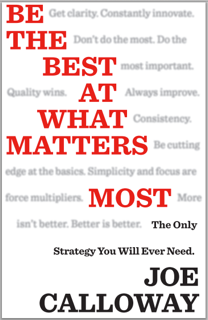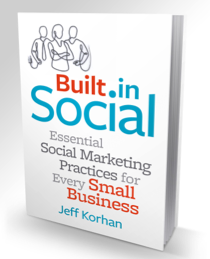
Successful companies seem to make everything look easy, because they have mastered their craft – doing only a few things, and sometimes just one thing better than any one else.
In fact, the concept of business best practices is just that – doing what needs to be done and doing it well.
In this interview with respected author and keynote speaker Joe Calloway, we discuss what makes the best companies successful, and how any business can learn how to do the same. As Joe puts it, the most successful businesses are simply rock solid at executing on the fundamentals.
Here’s the video that features our discussion of Joe Calloway’s new book, Be The Best At What Matters Most (Wiley 2013), with the three key points of that conversation summarized below.
Simplify
Joe Calloway has a gift for helping companies find their focus for getting to the next level – and that starts with simplification.
For any business to get to the next level, there has to be a collective agreement among the team members on what matters most for getting there. That’s the starting point.
Entrepreneurs and small businesses especially are known to “wear many hats.” The challenge is obviously learning which are the right hats – and then wearing them well.
Win on the Fundamentals
In recent years there has been a great of emphasis on delighting the customer by somehow creating some sort of “wow factor.”
Yet, in our current risk-averse economy, consumers today will be wowed by the assurance of knowing the basics will be done well – without exception.
Let’s face it, consumers today have a voice and they are using it to be heard. So, if there is one thing that every company should be doing, it’s making sure there are no mistakes. This means no surprises.
Sure, we all like to have pleasant surprises, but as Joe commented in our interview, before you worry about the sizzle of the steak, make sure you get the steak right.
Take Action
In every business the greatest challenge has been and always will be taking action. This is what separates average companies from the great ones.
For small businesses, consistently taking action is what got our entrepreneurial ventures off the ground. We worked impossible hours and wore many hats.
To get to the next level requires something else – taking action on what is most important. Find out what that is, specifically for your customers.
Then take action on that to consistently set the expectation of what your company stands for. You can think of this as your brand, mantra, mission, or promise.
Whatever you call it, being the best at what matters most is the only strategy you will ever need. When you get that right, your marketing takes care of itself, as it is driven by the customer.
What’s the singular focus of your business? Please share your thoughts.
About the Author: Jeff Korhan, MBA, is the author of Built-In Social: Essential Social Marketing Practices for Every Small Business and host of This Old New Business podcast.
He helps mainstream businesses adapt their traditional growth practices to a digital world. Connect with Jeff on LinkedIn, Twitter, Facebook, and Google+



